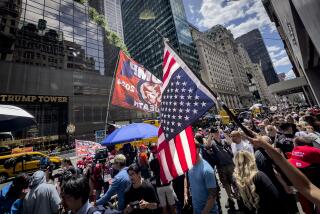His Fervent Quest Never Flagged
Dave Albert had his first brush with politics when the Lomita City Council approved a plan to put up a subdivision next to his property, where he has raised chickens, sheep, rabbits, goats and cattle. He told council members that if they so much as thought about making his cows find a new home he would unseat one of them in the next election.
That was four years ago. Albert made good on his promise and, as a council member, played a pivotal role in tackling redevelopment issues and a city budget crisis. But the manufacturing executive, who at one time didn’t even know the way to City Hall, will probably be remembered as the man who championed a local issue with national repercussions--a request to fly the nationally recognized POW/MIA flag over the Lomita post office--all the way to Washington and won.
Albert’s successful quest to convince Congress to pass a law that calls for the black-and-white flag to be flown at all post offices and other federal buildings nationwide on patriotic holidays--signed into law by President Clinton last week--stands as testimony to how one persistent man with a mission can make a difference.
“A lot of people may have had the same sentiments Dave Albert had, but they didn’t take the action that he took,” said Judie Mills Taber, Western coordinator of the National League of Families of American Prisoners and Missing in Southeast Asia. “His actions have made a difference throughout the nation. . . . It’s really encouraging for the POW/MIA families.”
Albert’s campaign began last year when the postmaster general would not allow the POW/MIA flag--which symbolizes the nation’s commitment to finding all military personnel who are prisoners of war, missing in action or otherwise unaccounted for--to be flown above the Lomita post office. Postal officials informed him that only the American and Postal Service flags could wave above the 40,000 postal facilities nationwide and that it would take an act of Congress to change that law.
*
“The post office really pissed me off,” said Albert, 44, a manufacturing executive with no military background. “It’s not their post office. It’s everyone’s post office. I decided, yes, we will fly the flag, and we will do it legally.”
Albert fired off about 3,500 letters encouraging mayors and city managers in many communities west of Kansas and governors of all 50 states to endorse his call for flying the flag at their city buildings and writing Postmaster General Marvin Runyon and President Clinton, urging them to modify the postal regulation.
Hundreds of city councils supported his proposal, including the one in Rolling Hills Estates, which was ordered to remove the POW/MIA flag from a local post office in January when the regional postmaster learned that it had been flying there for six years.
The Los Angeles County Board of Supervisors vowed to fly the flag, which features a silhouette of a captive being watched from a guard tower and the words “You will not be forgotten,” at all county facilities on patriotic holidays.
In March, Rep. Jane Harman (D-Torrance) introduced the legislation calling for the flag to be flown at all federal buildings on six holidays: Armed Forces Day (the third Saturday in May), Memorial Day, Independence Day, Flag Day, National POW/MIA Recognition Day (the third Friday of September) and Veterans Day.
“Dave fully exercised his right to petition his congresswoman,” said Harman of Albert’s insistence on changing the law. “He had the right idea at the right time, and his persistence made a huge difference.”
Albert is no stranger to controversy. The avid deer hunter, who raises his animals on half an acre behind his Lomita home, is not afraid of being a rabble-rouser if it gets the job done.
When the traffic from a Torrance shopping center created havoc on adjacent Lomita streets two years ago, Albert showed up at Torrance City Council meetings to demand that the neighboring city pay for damages. Torrance refused, so Lomita sued. The suit was settled when Torrance and the shopping center coughed up $130,000 to fix the streets, which had been worn down by the extra load.
The POW/MIA flag victory is especially sweet for Albert, who spent hundreds of hours and used his own money to cover many of the expenses he incurred along the way. He only wishes it had not been quite so difficult.
Raising $13,000 for the newly remodeled Lomita Veterans War Memorial and getting to keep his cattle--both of them--weren’t that challenging. Albert said he hasn’t received a personal response from the president or the postmaster in the 11 months he spent getting the law changed.
“The commander in chief should be saying something, anything,” said Albert, expressing continued frustration. “He should say, ‘Atta boy,’ or ‘This is something we should have done a long time ago.’ At this point it would be better if he said, ‘No comment,’ instead of [offering] no comment.”
Nanda Chitre, a White House spokeswoman, was unable to obtain a comment from the president. Postal officials, who have long contended that they are not against flying the flag, said they would “happily comply” with the new law.
*
“We are the only federal agency in every community in America,” said Art Shealy, a Washington-based spokesman, adding that the Postal Service will be ready to hoist the flag on Armed Forces Day in May. “We’re happy to now be part of a nationwide effort to remember POWs and MIAs and their families.”
Albert is satisfied that his hard work and perseverance paid off.
“From almost every war there is still someone missing from my community,” said Albert, who ran for public office on a one-term-only platform and recently completed his tour of duty.
“If no one remembers them, they’ll be forgotten. . . . Now, whenever that flag is flown, they’ll be remembered.”
More to Read
Get the L.A. Times Politics newsletter
Deeply reported insights into legislation, politics and policy from Sacramento, Washington and beyond. In your inbox three times per week.
You may occasionally receive promotional content from the Los Angeles Times.










